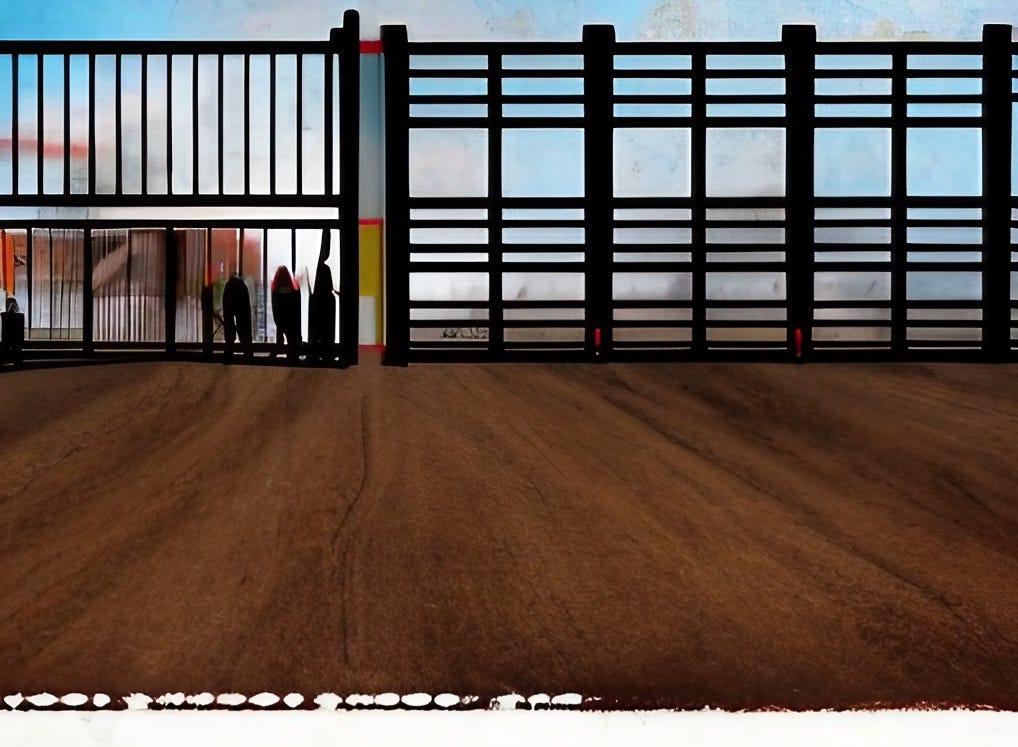Objection #5 - "Amnesty Rewards Lawbreaker!"
Ronald Reagan answers the populist position on amnesty for undocumented Americans
This post is the sixth in a series of articles debunking the most common populist arguments against open immigration. The arguments are based on actual responses to callers from dozens of interviews about immigration on The Bob Zadek Show.
“The American people have made it very clear—crystal clear—that they want to see the government fulfill its responsibility to enforce the laws and to take steps to control illegal immigration, not to reward bad behavior with amnesty and taxpayer funded benefits. Amnesty and economic incentives only encourage more illegal immigration and lawlessness.” — David Vitter, former Senator from Louisiana
—
“I believe in the idea of amnesty for those who have put down roots and who have lived here even though sometime back they may have entered illegally.” — President Ronald Reagan, on his support for the Immigration Reform and Control Act of 1986
At the heart of the immigration debate is the question of what should happen to the more than 11 million people who are already here without legal documentation.
To me, the answer is simple: we should offer them their preferred path of either residency or citizenship—the same as those who have not yet entered the country, but wish to do so. The most common objection to this approach is that it leaves the “crime” of illegal border crossing unpunished. After all, objectors say, aren’t we a nation of laws?
Immigration amnesty is a legal concept which provides certain non-United States aliens with the ability to remain in the United States, either on a temporary or permanent basis.
The word “amnesty” provokes a strong response in those like former Louisiana Senator David Vitter, who see it presenting a moral hazard—i.e., a perverse incentive that increases risky behavior by shielding people from the consequences of their actions. Amnesty, Vitter says, encourages more illegal action on the part of immigrants. However, he neglects the fact that people have been coming to this country since we were mere colonies. The rest of the world doesn't need any more encouragement to immigrate here. The encouragement is America—the principles of a free market, free enterprise, and personal freedom.
The national controversy around amnesty peaked around 2010 with the re-introduction of the 2001 DREAM Act legislation, which would have qualified certain immigrants for temporary residency if they were below a certain age and had graduated from High School. Among those eligible was one Sofia Campos – a senior at UCLA when I interviewed her back in 2010. She was a strong student, who aspired to go into public health & urban planning in the United States after graduating.
She was also undocumented.
Although she had lived in the U.S. since she was six years old, Sofia had no idea she was here “illegally” until she was 17 years old and already on her way to college.
“My parents finally had to tell me that I did not have that social security number which made me an undocumented person here in the country,” she recalled, noting that she was unable to get financial aid because of her undocumented status.
Sofia is just one of hundreds of thousands of residents who came to this country when they were very young, and did nothing wrong. Certain states like California have passed their own version of the DREAM Act, creating temporary residency programs for children of illegal immigrants to continue their schooling and obtain financial aid scholarships, but Congress has still been unable to pass a federal version of this lowest level of amnesty.
According to California’s statue, Sophia was still eligible for reduced in-state tuition. But without a federal DREAM Act, she knew that she would be forced to work under the table if she wanted to stay in the United States after graduating. Creating a path to citizenship wouldn’t cost the U.S. taxpayer a penny. To the contrary, it would have allowed Sofia to start working in a better job, and begin paying into social security immediately.
What Would Reagan Do?
In 1986, President Ronald Reagan signed the Simpson–Mazzoli Act (aka the Immigration Reform and Control Act of 1986), a bipartisan bill that granted amnesty to about three and a half million then-illegal immigrants. Conservatives take note: Reagan passed an amnesty bill without destroying the political and civic life in America.
Hardly any Republicans complained when Reagan signed the bill. Part of the deal was that we would beef up our border security, and we did. However, this did nothing to address the real underlying source of immigrants crossing our border illegally, which is the burning desire for freedom worldwide. On a show debunking misconceptions about immigrant back in 2015, the Cato Institute’s Alex Nowrasteh pointed out that the bill didn't create a guest worker visa program or a green card program to satisfy the craving for economic freedom. Thus, it should be no surprise that people continued to have to enter illegally.
Amnesty, therefore, becomes a band-aid for a longer-term problem. The reason we are still talking about it today is that Congress still can’t make up its mind about how to deal with the dual problems of a) those who are already here and b) those who wish to come here for a better life.
Given Congress’s failure to act, the President has frequently taken it upon himself to act in their place. In 2012, Barack Obama decided to act unilaterally in issuing an executive order – Deferred Action for Child Arrivals, or DACA – which essentially established the main tenets of the DREAM Act through so-called “administrative rule-making.” It set law enforcement priorities for ICE, making it unlikely that young people would ever actually get deported.
It looked like a law, and it talked like a law, but it lacked the permanence of an actual law. Thus, President Trump reversed the rule in 2017. Leaving such an important issue in the hands of the executive branch not only violates the founders’ plan for separation of powers, but leaves these millions of undocumented residents in limbo—unable to plan their lives and contribute productively to society and to the economy. It’s no wonder people are saying that immigrants won’t assimilate, when those same immigrants don’t know whether they will be allowed to continue to call America home.
The Baseless Claim of a Moral Hazard
Returning to the moral argument voiced by Senator David Vitter that amnesty rewards bad behavior, one need to only look at the prevalence of amnesty when it comes to tax law, or the case of widespread amnesty during the Prohibition Era, to see that this is nonsense.
Is the IRS “rewarding bad behavior” when they negotiate a settlement over back taxes?
Tax authorities constantly offer amnesty programs to people who have misstated their tax liability.
Was the Federal Government rewarding bad behavior when they declined to prosecute those drinking establishments that were outed after Prohibition’s ill-fated reign had ended?
By dint of wholesale non-compliance, the public sends a message that the law is wrong—not the person in technical violation. To the British, Benjamin Franklin and John Adams were traitors who should have been hung accordingly. They committed treason, and yet they gave us a country.
In short, people tend to favor amnesty whenever they disagree with the law in question, and oppose it when they agree with the law. Opposition to amnesty is a thin veil covering a distaste for greater immigration altogether. And so I ask again—which part of illegal immigration do you oppose, the illegal part, or the immigrant part?
To the extent that people try to criminalize the act of trying to make a better life for you and your family, we can say that the law is just plain wrong.
In the legal profession, we make a distinction between laws that are malum prohibitum, and those that are malum in se. Malum in se refers to laws against murder, rape, robbery, theft, and things that every society acknowledges they're wrong. Malum prohibitum refers to acts which are wrong only because somebody in some legislative body decided that an otherwise innocent act should be unlawful. These are unnatural impositions to legislate morality (which cannot be legislated) and criminalize non-criminal behavior.
“It goes back to this founding idea in the Enlightenment that laws need to be discovered, not made,” notes Nowrasteh, “The laws that we all respect are similar across all human civilization. Laws that restrict immigration are created out of whole cloth by legislators, bureaucrats, and activists with no account of how humans actually view these things. That's why you get these law enforcement disasters out there.”
Short of full amnesty, Nowrasteh suggests that we might give undocumented immigrants two options:
One would be a very easy-to-get permanent work permit that could not be used to get citizenship. The other one would be a longer-term, more expensive path that would lead to citizenship if they desire.
He notes that not everyone who comes here wishes to vote. Instead, they want to work, or give their family a higher standard of living.
In the next step I will go into more detail on the reforms that are necessary to balance order and opportunity in our immigration laws. The problem is not those who want to come here. The problem is the law that prevents them. Peruvian economist Hernando DeSoto wrote a book called The Mystery of Capital, in which he says the following:
“The law must be compatible with how people actually arrange their lives. The law must conform to human behavior, not try to affect human behavior.”
Haven't we learned anything from prohibition, when the law tried to modify core human behavior? If anything is destructive to the rule of law in this country, it is passing laws that will be arbitrarily enforced because of the impossibility of consistent enforcement.
Let’s listen to Ronald Reagan: Amnesty is sound policy. Our current immigration policy is the disaster.







